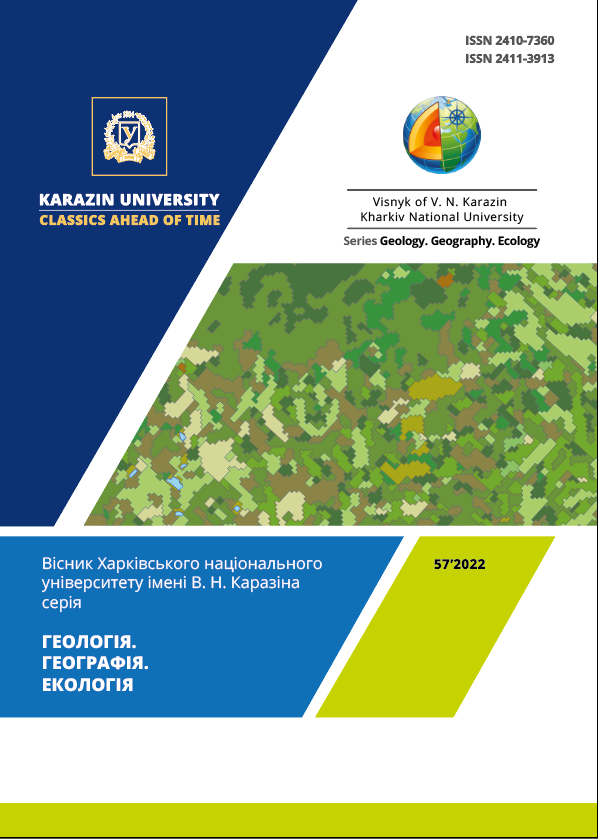Оцінка вразливості питних підземних вод бучацько-канівського водоносного комплексу в умовах довгострокової трансформації їх якісного складу
Анотація
Дана робота є продовженням попередніх публікацій авторів з удосконалення методичного підходу до оцінки вразливості (захищеності) питних підземних вод у межах Дніпровсько-Донецького артезіанського басейну (ДДАБ) та є практичною складовою цих досліджень. Задля пошуку та розробки оптимальних форм управління екологічною безпекою питного водопостачання населення регіону, апробовано удосконалений авторами підхід до оцінки вразливості (захищеності) питних підземних вод на стратегічно важливих водах бучацько-канівського водоносного комплексу (БКВК). Розроблено комплексні системи еколого-гідрогеологічного районування території центральної частини ДДАБ за ступенем екологічної небезпеки зниження якості питних підземних вод БКВК. Проведено районування території згідно небезпеки погіршення якості цих вод техногенними забруднювачами, які надходять у води у процесі низхідної вертикальної фільтрації та міграції із поверхні землі. Встановлено екологічно небезпечні території із потенційним зниженням якості питних підземних вод БКВК за рахунок елементів поверхневого генезису (водозабори міст Полтава, Лубни, Миргород, Велика Багачка, Красноград та деякі ін.). Проведено районування території згідно небезпеки погіршення якості підземних вод БКВК за рахунок висхідної міграції природних глибинних некондиційних вод. Встановлено екологічно небезпечні території із потенційним зниженням якості підземних вод за рахунок елементів глибинного генезису (водозабори міст Полтава, Ромодан, Миргород, Шишаки, Опішня, Гадяч, Красноград, Карлівка та деякі ін.). Практично доведено, що удосконалений авторами підхід до оцінки вразливості (захищеності) питних підземних вод є ефективним інструментом для прогнозування змін екологічного стану підземних вод на водозаборах території робіт у сучасних природних і техногенних умовах.
Завантаження
Посилання
Goldberg, V. M. (1983). Natural and technogenic factors of groundwater protection. Bulletin MOIP. 2, 103–110. [in Russian].
Yemchuk, T. V. (2011). Assessment of groundwater protection: methodological aspects and practical application. Hydrology, hydrochemistry and hydroecology. 1, 22, 45–50. [in Ukrainian].
Koshliakov, O. Ye., Dyniak, O. V., Koshliakova, I. Ye. (2014). To the question of vulnerability of drinking groundwa-ter within the boundaries of Kyiv city agglomeration, taking into account natural protection. Bulletin of Odessa National University. Series "Geographical and geological sciences". 19, 3 (22), 269–273. [in Ukrainian].
Levoniuk, S. M., Udalov, I. V. (2018). Geoecological criteria for improving the methodology for assessing the risk of groundwater pollution. Environmental safety: problems and solutions : materials of XIV International Scientific and Practical Conference. Kharkiv, Ukraine, 203–208. [in Ukrainian].
Levoniuk, S. M., Udalov, I. V. (2018). Ecological and hydrochemical features of the transformation of drinking groundwater quality under the influence of technogenic and neotectonic factors (on the example of buchak-kaniv water intakes of Eastern Ukraine. Research and environmental geochemistry. 1 (19), 30–40. [in Ukrainian].
Levoniuk, S. M., Udalov, I. V. (2018). Comprehensive geoecological assessment of drinking groundwater protection. Bulletin of Odessa National University. Series "Geographical and geological sciences". 2 (33), 111–133. [in Ukrainian].
Nazarenko, E. A., Nikoziat, Yu. B., Ivashchenko, O. D. (2015). Assessment of health state of population living within the territory of biogeochemical province with high fluoride content. Scientific and technical journal. Kyiv. 2 (12). 80–84. [in Ukrainian]
Ostroukh, O. A. (2013). Qualitative assessment of the groundwater natural protection by using GIS. Bulletin of V. N. Karazin Kharkiv National University. Series "Geology. Geography. Ecology". 38, 1049, 34–38. [in Ukrainian].
Pashkovskyi, I. S. (2002). Principles for assessing the groundwater protection from pollution. Modern problems of hydrogeology and hydromechanics. 1, 122–131. [in Russian].
Popov, O. I., Podryhalo, L. V., Danylenko, H. N., Semko, N. H. (2000). The impact of fluorine and its derivatives on the environment and the human body. Medical practice. Kyiv. 1. 87–89. [in Russian]
Rogachevskaya, L. M. (2002). Regional assessment of vulnerability of groundwater in the eastern part of Dnipro artesian basin to radionuclide contamination : PhD thesis. Moscow, 23. [in Russian].
Serdiukova, O. O. (2013). Hydrogeochemical features of fluorine in the hypergenesis zone of Donbas and some aspects of its influence on the human body. Bulletin of V. N. Karazin Kharkiv National University. The series "Ge-ology. Geography. Ecology". Kharkiv. 1084. 243–246. [in Ukrainian]
Smoliar, V. I., Petrashenko, H. I. (2007). Excess fluoride in drinking water and fluoride intoxication. Nutritional problems. Kyiv. 1. 15–17. [in Ukrainian]
Udalov, I. V., Levoniuk, S. M. (2019). Transformation of the qualitative composition of drinking groundwater in the central part of DDAB. Geochemistry of technogenesis. 2 (30), 46–55. [in Ukrainian].
Shestopalov, V. M., Boguslavskyi, A. S., Bublias, V. N. (2007). Assessment of the protection and vulnerability of groundwater, taking into account the zones of rapid migration. Kyiv, 120. [in Russian].
Shcherbak, O. V. (2013). Changes in the groundwater natural protection in conditions of flooding in the territory of Kherson region. Bulletin of Odessa National University. Series "Geographical and geological sciences". Iss. 18, № 1 (17), 249–253. [in Ukrainian].
Aller, L., Bennet, T., Lehr, J. H., Petty, R. (1987). DRASTIC: A standardized system for evaluating groundwater pol-lution potential using hydrogeologic settings. Washington: U. S. Environmental Protection Agency. EPA/600/2-85-018.
Ball, D., MacDonald, A., Dochartaigh, B., del Rio, M. (2004). Development of a groundwater vulnerability screen-ing methodology for the Water Framework Directive. Final report. Project WFD28. Edinburgh: SNIFFER, 52.
Civita, M., De Maio, M. (2004). Assessing and mapping groundwater vulnerability to contamination: The Italian «combined» approach. Geofisica Internacional. 43, 4, 513–532.
Sililo, O. T. N., Conrad, J. E., Dohse, T. E., Tredoux, G. (2001). A procedure for deriving qualitative contaminant attenuation maps from land type data. Journal of Hydrology. 241, 104–109. https://doi.org/10.1016/S0022-1694(00)00375-9
Van Stempvoort, D., Ewert, L., Wassenaar, L. (1995). A method for groundwater protection mapping in the Praire Province of Canada. PPWB Report No. 114. Saskatoon, Saskatchevan: National Hydrogeology Research Institute, 145.
Zhang, R., Hamerlinck, J. D., Gloss, S. P., Munn, L. (1996). Determination of nonpoint-source pollution using GIS and numerical models. Journal of Environmental Quality. 25 (3), 411–418. https://doi.org/10.2134/jeq1996.00472425002500030005x.
Цитування
Assessment of water quality from different water supply sources in the Kyiv district of the city of Kharkiv
Lisnyak A. A. & Kulyk M. I. (2024) Visnyk of V. N. Karazin Kharkiv National University series "Ecology"
Crossref





